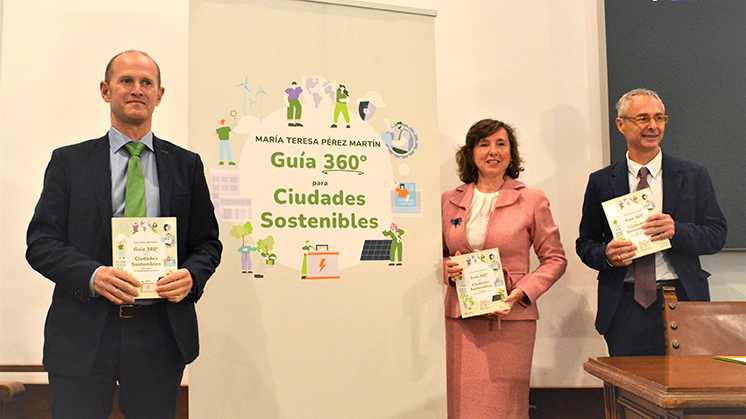We present the '360º Guide for sustainable cities' with the University of Salamanca
- The book proposes the development of urban policies associated with the circular economy and carbon neutral emissions at the local level.
- Its publication has been made possible thanks to the collaboration between the University of Salamanca and Iberdrola, and is part of the company's commitment to sustainability and the environment.
- The rector and the Iberdrola delegate in Castile and León accompanied the author, Teresa Pérez Martín

From left to right: Iberdrola's delegate in Castile and León, Miguel Calvo; the author of the guide, Teresa Pérez Martín; and the rector of the University of Salamanca, Ricardo Rivero.
‘360º Guide for sustainable cities: How to achieve successful transformation' is the title of the book published by Ediciones Universidad de Salamanca with the collaboration of Iberdrola, and authored by María Teresa Pérez Martín. The rector, Ricardo Rivero, and the Iberdrola delegate in Castile and León, Miguel Calvo, took part in the presentation of the work, which took place in the Aula Francisco de Vitoria of the Escuelas Mayores building.
It is a tool specially designed to facilitate the work of people working on sustainable urban development, including the keys to building cities that are self-sufficient through the circularity of goods and services, carbon neutral and resilient to environmental and social risks.
Download '360º Guide for sustainable cities' [PDF]
"This guide is integrated into the strategic objectives of the university, and is an excellent tool for local authorities elected on 28 May to address sustainable policies, and not only the big cities," said the rector in his speech.
For his part, Miguel Calvo emphasised "Iberdrola's support for an initiative like this, which fits in with the decarbonised and environmentally friendly model that we defend. And it will allow local managers to access resources to do a good job, for which we are at their disposal".
María Teresa Pérez, who holds a PhD in Law from the University of Strasbourg and has a distinguished professional career in several countries, is working on an international project at the University of Salamanca. Her objective, as she explained, is to "accompany local stakeholders in the design of a smart and sustainable urban environment, considering the city as a living, agile and resilient ecosystem".
The 360º Guide provides support to operate the energy transitionExternal link, opens in new window. effectively, through the electrification of operating systems, decarbonisation of transport, energy efficiency of buildings, among other policies. It also addresses sustainable mobilityExternal link, opens in new window. as an intermodal and multi-energy service, adapted to the needs of citizens.
The book is structured around seven chapters covering all phases of the process, from analysis and diagnosis to financing, implementation and evaluation of results.
The author has stressed the need to use nature-based solutions in climate change mitigation and adaptation actions. She also stresses the importance of designing cities that are agile in responding to citizens' needs, smart in managing knowledge and financial resources, and capable of applying artificial intelligence in the search for solutions, while retaining and enhancing human talent.
Collaboration with Iberdrola
The publication of this new book has been made possible thanks to the collaboration between the University of Salamanca and IberdrolaExternal link, opens in new window., and is part of the company's commitment to sustainability and the environment.
As an effective way to combat climate change, the company wants to drive and lead the transition to a decarbonised and digital model by carrying out sustainable activities.
This is the reason for the publication of the '360° Guide for Sustainable Cities: How to achieve successful transformation', which is presented as a guidance tool specially designed to facilitate the work of all those working on sustainable urban development in any city in the world.
It aims to develop urban sustainability strategies and drive the processes of the 2030 Agenda and its 17 Sustainable Development GoalsExternal link, opens in new window., identifying the success factors for creating thriving, sustainable and smart cities.
The University of Salamanca and Iberdrola maintain a close relationship and proof of this are the collaborations they carry out with the aim of developing research, innovation and training activities in areas that are of strategic interest to the company.